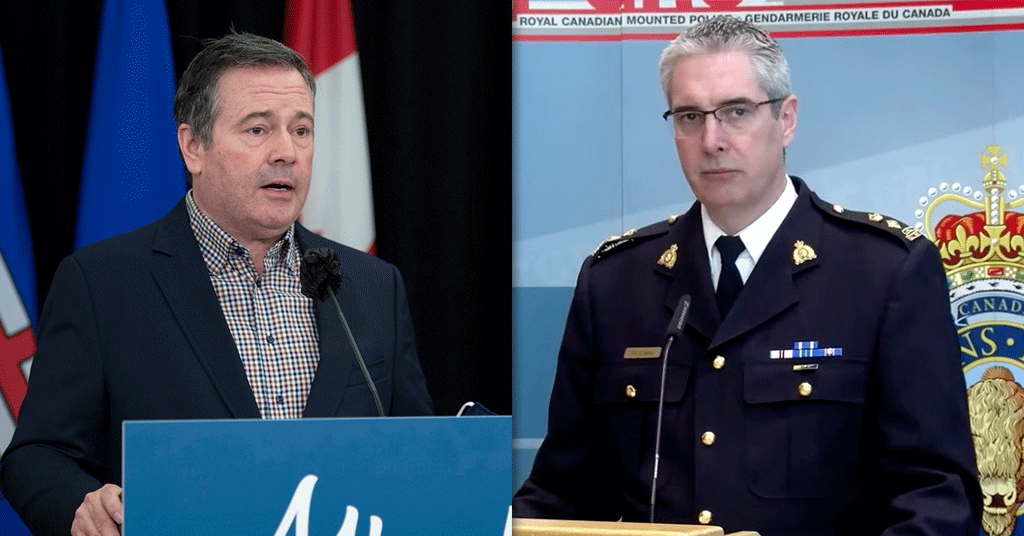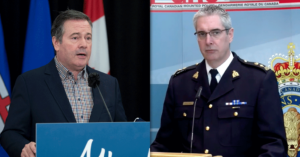
RCMP Confirms Hundreds On UCP Voter List Told Police They Had ‘No Knowledge’ They Ever Voted
RCMP ends five-year investigation into UCP voter fraud allegations after hitting dead-ends in determining who cast fake votes
The RCMP has ended a five-year investigation into allegations revolving around the 2017 UCP leadership vote without laying criminal charges, despite finding “clear evidence” hundreds of people on a UCP voter list had “no knowledge” of casting votes.
At a press conference Friday, the RCMP announced no criminal charges would be laid in relation to Jeff Callaway’s so-called “kamikaze” campaign, or allegations of identity theft and voter fraud connected to Jason Kenney’s UCP leadership campaign.
The RCMP acknowledged that Elections Alberta previously investigated and found Callaway’s campaign in violation of election laws and acknowledged it had uncovered evidence of “suspicious votes” in the UCP leadership vote.
However, the RCMP ultimately concluded investigators found “insufficient evidence” to lay criminal charges against any individuals.
“This high profile investigation was extremely complex and time-consuming due to several factors,” said RCMP Supt. Rick Jané during the press conference. “The sheer volume of data to be analyzed and investigated took a significant amount of time.”
“Furthermore a portion of this data required that judicial authorizations be obtained both domestically and outside of Canada.”
The RCMP said its five-year investigation involved interviews with over a thousand individuals, examining tens of thousands of emails and racking up $460,877 in overtime and travel expenses for the special investigation unit.
Jané said investigators conducted 170 interviews with UCP donors and staffers in relation to the kamikaze investigation, as well as interviewing an additional 1,200 individuals in the voter fraud investigation.
EXCLUSIVE:
The RCMP have questioned multiple individuals about allegations of election fraud in the 2017 UCP leadership vote.
Investigators asked about fake e-mail addresses and high-ranking members of Jason Kenney’s leadership campaign.https://t.co/JFiKLy90Eu #ableg #cdnpoli
— PressProgress (@pressprogress) April 10, 2019
Allegations of fake votes and election fraud during the 2017 UCP leadership vote were first reported by PressProgress in February 2019 and later, in April 2019, CBC News reported that it confirmed fake votes were successfully cast in the leadership vote.
A UCP membership list obtained by PressProgress included names connected to email addresses from dead domains. Numerous individuals on that list told PressProgress they had never seen the email addresses before while others insisted they never signed up for the UCP.
The RCMP investigation was first confirmed by PressProgress after UCP members reported investigators had visited their homes with questions about the emails in March 2019.
According to a former UCP MLA’s letter to the RCMP obtained by PressProgress, the scheme allegedly involved Kenney’s campaign team collecting names, addresses and other identification from real Albertans but adding fake email addresses to some membership applications which were used to cast fake votes.
In 2019, @pressprogress was first to report on alleged election fraud in the 2017 UCP leadership vote and first to confirm an active RCMP investigation.
A former UCP MLA alleged fake votes were cast using fake emails, VPNs and so-called “Kenney Kiosks.”https://t.co/kBUt2zu4u9 pic.twitter.com/0NAiU5z1zT
— Luke LeBrun (@_llebrun) March 8, 2024
Jané did not directly address whether investigators conclusively substantiated or debunked those specific allegations, nor did he discuss the potential use of VPNs to mask IP addresses and hide the identities of the individuals who cast fake votes.
Although the RCMP did not press charges, Jané said investigators identified at least 200 or so examples of “suspicious votes”:
“The online platform used by the UCP to hold the leadership contest was identified and the RCMP obtained that database through a legal process. It contained data from more than 60,000 voters.
The RCMP analyzed the data and identified several suspicious cross-sections of votes where multiple votes were cast using the same phone number or originating from the same IP or Internet Protocol address.
Similar to an in-person ballot the data did not show which candidate was voted for, but only that the vote had been cast using that unique identifier.”
In a Q&A with journalists, Jané later noted these “suspicious votes” involved situations where police had “clear evidence” individuals whose names appeared on a UCP voter list personally told police they had “no knowledge” they had ever voted:
“…It’s where we had clear evidence from the person whose identity was associated to that vote had no knowledge or did not permit anyone to vote on their behalf. So, in those cases, obviously, we tried to identify either, there was multiple different mechanisms. Sometimes it was an email address the PIN was delivered, sometimes it was through a phone system. And then also how the vote was cast. It could be cast through a telephone, it could also be cast by logging into a website. We have evidence to suggest there is potential fraud in the case of those votes, but it’s important to clarify, that those matters have not been tested in court and there was insufficent evidence to lay a charge and our biggest obstacle was being able to satisfy ourselves that we would have sufficient evidence around the identity of the persons responsible to prove that. And when you think about how voting works, you need a witness often to an offence. And if you don’t have a witness you need to tie the device that was connected the offence, if it’s even knowable, because there’s ways sometimes there’s not knowable. But if it’s not knowable to that suspect in a clear manner and we didn’t have that evidence at the end of the day.”
Jané said the RCMP did not believe the number of suspicious votes would have ultimately influenced the outcome of the vote.
Despite the RCMP confirming that at least hundreds of “suspicious” incidents of potential identity theft and voter fraud did occur, former Premier Jason Kenney welcomed the RCMP’s statement as a “total vindication.”
“These obviously ridiculous bad faith complaints led to a string of defamatory accusations and a five year long RCMP investigation involving dozens of officers conducting nearly 2,000 interviews and spending millions of dollars of personnel time and related expenses,” Kenney said on social media.
“Today’s outcome is a total vindication of my 2016 leadership campaign and the UCP’s administration of that election.”
Today’s statement by the RCMP confirms categorically what I have said all along: there there was no wrongdoing on the part of me or my 2017 UCP leadership campaign.
My statement: pic.twitter.com/T9OFjOSFuI
— Jason Kenney 🇨🇦🇺🇦🇮🇱 (@jkenney) March 8, 2024
Supt. Jané did not mention reporting by the Toronto Star that RCMP investigators left voice recorders at the home of one of Kenney’s organizers in January 2020, a development that had the potential to expose witnesses and compromise the investigation.
One person interviewed by the RCMP told The Star the incident “became common knowledge within the UCP” and had a “very chilling effect” on witnesses.
Our journalism is powered by readers like you.
We’re an award-winning non-profit news organization that covers topics like social and economic inequality, big business and labour, and right-wing extremism.
Help us build so we can bring to light stories that don’t get the attention they deserve from Canada’s big corporate media outlets.
Donate



